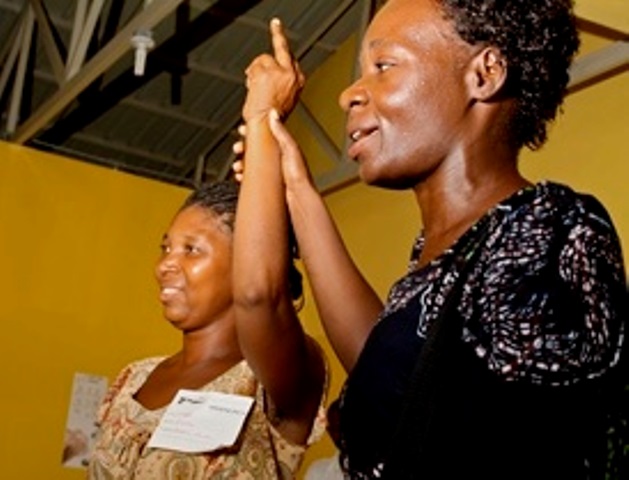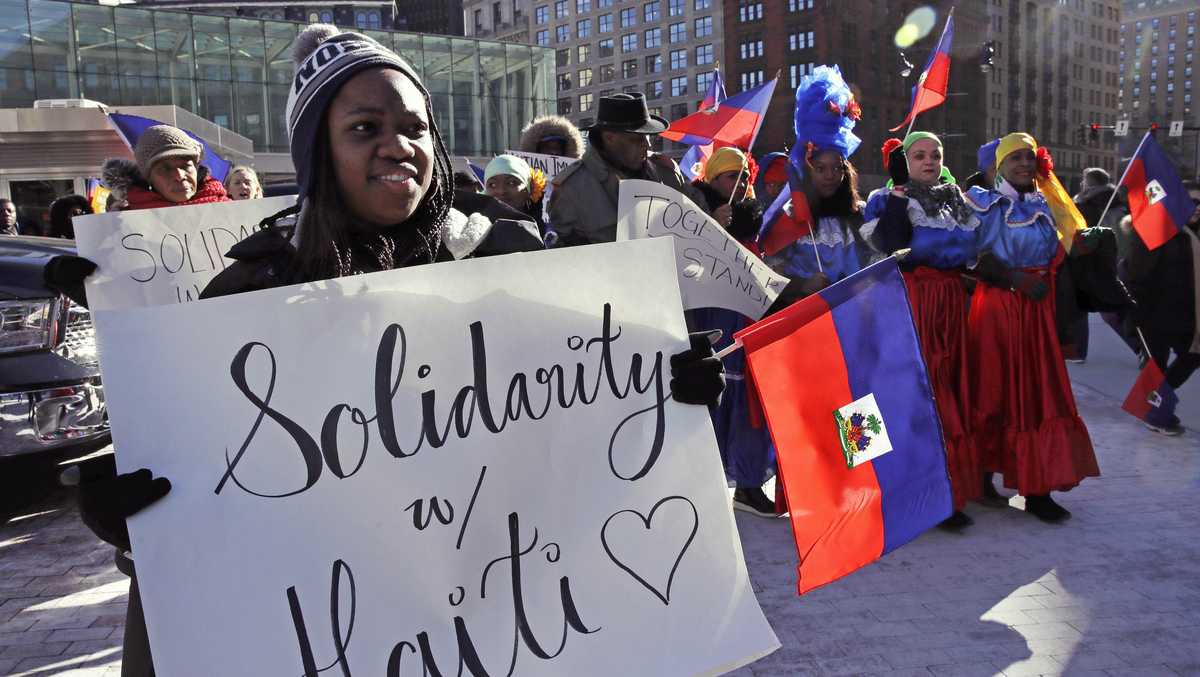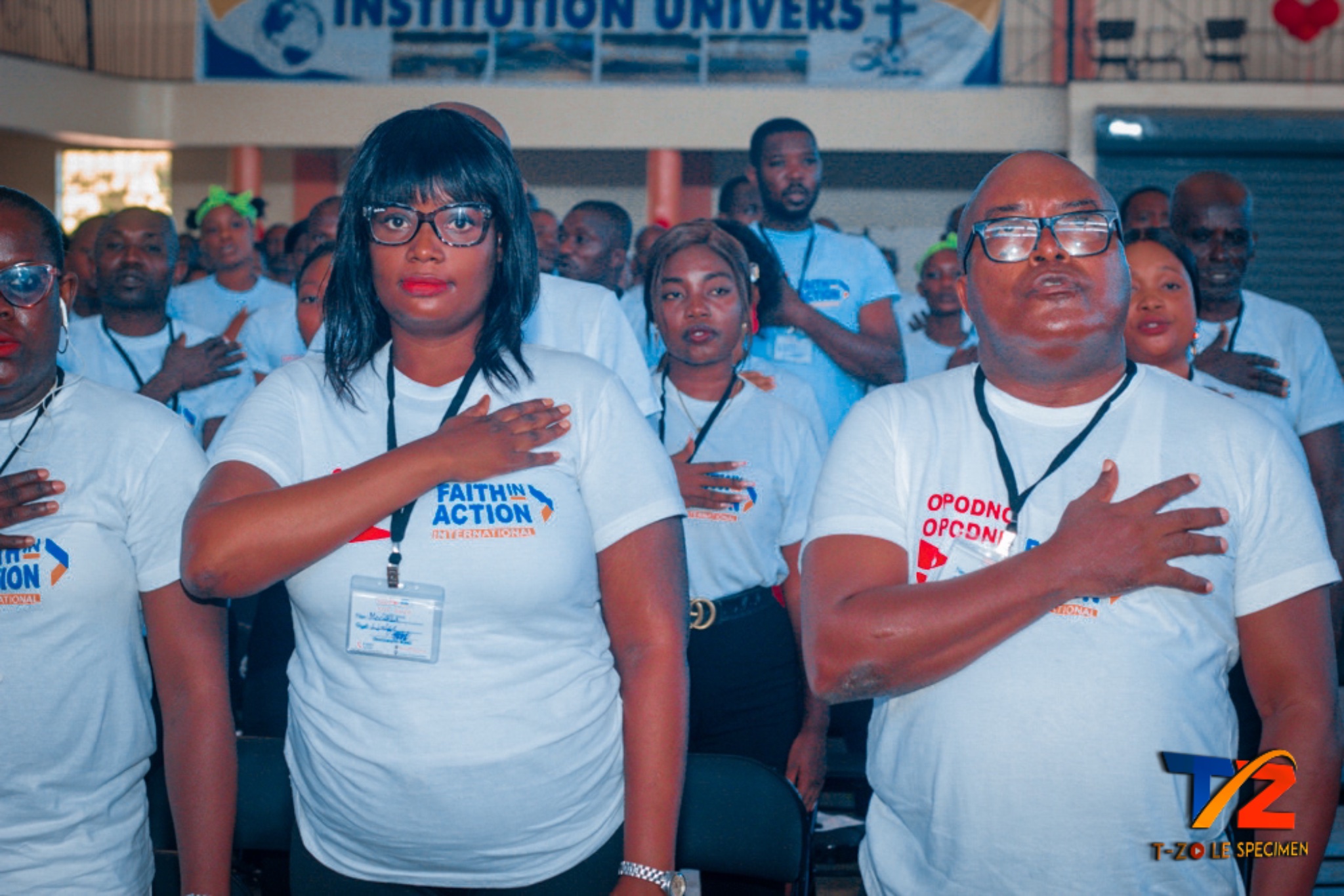Grassroots Organizing in Haiti
Faith in Action International has supported grassroots organizing in Haiti since 2014. Our Haiti affiliate, the People’s Organization for the Development of Haiti (OPODNE), works in 56 communities across Northeast Haiti and four communities in North Haiti. In each community, local residents meet weekly to listen to their neighbors, decide on local priorities, and work together to solve community issues. OPODNE’s local teams also join together to lead larger campaigns to improve health care and agriculture and fight hunger in Haiti. In the face of daunting challenges, ordinary Haitians are working through OPODNE to carry forward a long tradition of working together to create a better future for their families, communities, and country.

Restoring the capacity of Haitians to feed themselves
OPODNE is using grassroots organizing in Haiti to fight hunger by helping small-scale farmers harvest more crops. While the high cost of imported food leaves more than half of Haitians hungry, good land lies fallow across the country. With Haiti experiencing a decade-long drought, local farmers and community leaders from OPODNE are pressing for investments in irrigation, seed banks, tools, and assistance from agronomists to help farmers adapt to climate change. OPODNE listened to 4,400 farmers to develop its LET’S PLANT TODAY SO THAT WE CAN FEED OURSELVES TOMORROW campaign. As one element of this Haiti anti-hunger campaign, OPODNE has partnered with the St. Barnabas Agricultural Center to establish the Northeast Haiti Community Seed Bank. The Seed Bank is beginning to make high-quality seeds available to local farmers, along with advice on planting from agronomists.
Building community-led cooperatives and micro-lending programs
Grassroots organizing in Haiti is reviving long-standing Haitian traditions of economic cooperation. OPODNE community teams have formed and sustained twelve cooperatives in eight communities (Terrier Rouge household goods wholesale co-op; Capotille peanut, banana, and fish-farm co-ops; Grand Bassin chicken co-op: Phaeton fishing co-op); Mombin Crochu agricultural and child care co-ops; Mont Organise pepper and goat co-op; Caracol vegetable co-op; & Vallieres chayote co-op) generating an estimated $300,000 USD in income. Income from cooperatives is divided 40% to income for participants, 40% reinvested in co-op projects, 10% to emergency funds, and 10% to support OPODNE costs. They’ve also created micro-lending projects in four communities (Mombin Crochu, Mont Organise, Gran Bassin, and Capotille). Moreover, in a country where the government is dysfunctional and lacks resources, OPODNE members have organized dozens of community improvement activities like tree planting, clean-ups, teacher training, water purification, and completing a contract to build a road between Mombin Crochu & Grand Savanne, which employed 88 people.
Changing how the U.S. Agency for International Development (USAID) operates in Haiti.
OPODNE leaders are using community organizing in Haiti to push USAID to work through local organizations and priorities in Haiti, rather than foreign contractors. Since 2010, USAID has given 96.3 percent of all of its funding to help Haiti to large U.S.-based for-profit contractors and international NGOs. The U.S. General Accounting Office has issued a series of tough reports finding that USAID’s projects often don’t match local needs and many times fall far short of their promised goals. OPODNE is working with Haitian diaspora communities in the U.S. to press USAID to include small-scale Haitian farmers in the agency’s response to hunger in Haiti. After the 2021 earthquake, OPODNE and Faith in Action International published: Haitians Rebuilding Haiti: Foreign Assistance Lessons from the 2010 Earthquake. Our December 3, 2021 memo to USAID’s Haiti Mission detailed how USAID’s Haiti Strategic Framework could support Haitian-led efforts to help small-scale farmers adapt to climate change and meet local food needs. Supporters can add their names to the thousands of people calling on USAID to change its approach to development in Haiti at Plant Today So We Can Feed Ourselves Tomorrow.
Promoting better health through grassroots organizing in Haiti
In 2020-21, OPODNE lead a large-scale department-wide COVID education and prevention campaign in Northeast Haiti (pop. 393,967). This campaign reached 35,000 people, through weekly radio shows, training 600+ community COVID educators, announcements at public markets, and distributing masks, gloves, disinfectant, dozens of washing stations, and 5,700 educational fliers. OPODNE and Faith in Action International worked with allies, including the Catholic Medical Mission Board, to advocate for COVID vaccines to be released to Haiti. In 2021-22 OPODNE worked with the regional ministry of health to raise awareness and acceptance of COVID vaccines.
Learn more about grassroots community organizing in Haiti
The Organisation Peuple Œcuménique pour le Developpment du Nord-Est (OPODNE) was founded in 2014 to promote grassroots organizing in Haiti. OPODNE’s mission is to raise incomes and improve living conditions in Haiti by developing the leadership and power of local residents. Through OPODNE, grassroots leaders are taking charge of the development of their communities. They are listening to the concerns of their neighbors, setting community priorities, organizing economic cooperatives, negotiating development projects, and holding public officials accountable.
OPODNE’s membership is organized through local teams of residents in mostly rural, often very remote communities across Northeast and North Haiti. OPODNE members are primarily small-scale farmers and merchants but also teachers and medical workers. OPODNE was founded with support from the Catholic Church, and more than 20 Catholic and Protestant clergy participate in the organization, making resources and land available for OPODNE’s community improvement projects.
OPODNE is also currently working with Cap-Haïtien Archbishop Launay Saturné (who is also the President of the Haitian Catholic Bishops Conference) to seed a new sister-organization in the Nord Department. The 56 Northeast communities where OPODNE works include: Caracol 1, Caracol 2, Cahesse, Bas- Saline, Lombard, Village ECAM, Gran Bassin, Ferrier, Mombin Crochu, Bois de, Grand Savanne, Laguamithe, La Hatte, Logathe, Sylvestre, Mont Organise, Terrier Rouge, Paulette, Phaeton, Sainte Suzanne, and Vallieres. Teams of OPODNE leaders meet weekly in each of the 56 communities where the organization works. Every summer, each team organizes elections for their President and Board Members. Hundreds of people in each community vote in these elections.
How you can support grassroots organizing in Haiti
Donate today to help OPODNE grow its grassroots organizing in Haiti. Your contribution will help hire local residents as grassroots organizers in Haiti. Learn more about Faith in Action International’s Way Forward in Haiti campaign and grassroots organizing worldwide by signing up for our monthly newsletters.


